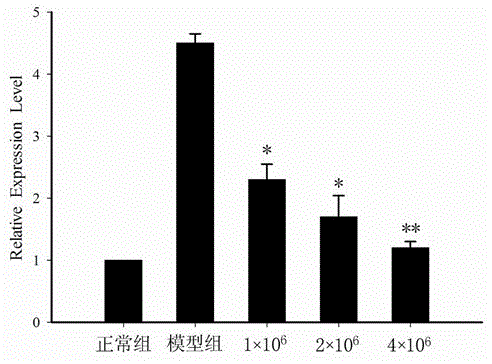Stem cell preparation for treating hepatic fibrosis
A stem cell preparation and liver fibrosis technology, applied in animal cells, vertebrate cells, bone/connective tissue cells, etc., can solve the problems of decreased proliferation and differentiation potential, inconsistent culture programs, and restrictions on large-scale use, so as to improve liver function. Functional status, not limited by ethics, and the effect of promoting liver pathological recovery
- Summary
- Abstract
- Description
- Claims
- Application Information
AI Technical Summary
Problems solved by technology
Method used
Image
Examples
Embodiment 1
[0023] Example 1: Preparation of Menstrual Blood Stem Cell Injection
[0024] Collect menstrual blood samples from donors for routine microbial and infectious disease pathogen safety testing, use 1.0779 / ml Ficoll for density gradient centrifugation, and separate mononuclear cells from qualified samples, wash the isolated mononuclear cells 3 times with PBS, adjust Cell density to (3-5)×10 6 cells / ml, seeded on the bottom area of 75cm 2 Put in the culture flask of 37 ℃, 5% CO2 incubator expansion culture, use DMEM culture medium, the volume content is the double antibody culture medium of 1%, the volume content is 1% amphotericin B, the volume content is 1% gluten Incubate the cells with aminoamide and cell culture medium with a volume content of 20% fetal calf serum; after 48 hours of cell culture, digest with 0.25% trypsin-EDTA for 5 minutes, add an appropriate volume of complete medium to neutralize the activity of trypsin, and blow gently with a pipette , to suspend adhe...
Embodiment 2
[0027] Example 2: Establishment of mouse liver fibrosis model
[0028] ICR mice were intraperitoneally injected with CCl 4 (in l ml CCl 4 / kg dose injection containing 10% CCl 4 olive oil) to establish liver fibrosis model, injected twice a week for 4 consecutive weeks.
Embodiment 3
[0029] Example 3: Transplantation test of menstrual blood stem cells
[0030] Tail vein injection transplantation experiment: liver fibrosis model mice were divided into 3 groups, and l×10 6 cells / 100μl, 2×10 6 cells / 100μl and 4×10 6 Each cell / 100 μl cell dose, another injection of 100 μl PBS was used as a control, both were injected once. Maintain CCl during transplantation 4 Inject until mice are anesthetized and sacrificed for sampling.
[0031] Evaluation of the living conditions of the mice: the mice in the control group were active, their fur was shiny, and their diets were normal. The mice in the model group had reduced activity, dry fur, and reduced food intake. The mice in the treatment group became active gradually, their fur dryness decreased, and their food intake increased.
[0032]Liver function index: On the 28th day after cell transplantation, the mice in the model group, the control group and the transplantation group were anesthetized with ether and blo...
PUM
 Login to View More
Login to View More Abstract
Description
Claims
Application Information
 Login to View More
Login to View More - R&D
- Intellectual Property
- Life Sciences
- Materials
- Tech Scout
- Unparalleled Data Quality
- Higher Quality Content
- 60% Fewer Hallucinations
Browse by: Latest US Patents, China's latest patents, Technical Efficacy Thesaurus, Application Domain, Technology Topic, Popular Technical Reports.
© 2025 PatSnap. All rights reserved.Legal|Privacy policy|Modern Slavery Act Transparency Statement|Sitemap|About US| Contact US: help@patsnap.com



